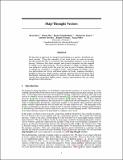| dc.contributor.author | Kiros, Ryan | |
| dc.contributor.author | Zhu, Yukun | |
| dc.contributor.author | Salakhutdinov, Ruslan R. | |
| dc.contributor.author | Zemel, Richard | |
| dc.contributor.author | Urtasun, Raquel | |
| dc.contributor.author | Fidler, Sanja | |
| dc.contributor.author | Torralba, Antonio | |
| dc.date.accessioned | 2018-02-05T16:14:54Z | |
| dc.date.available | 2018-02-05T16:14:54Z | |
| dc.date.issued | 2015-12 | |
| dc.identifier.uri | http://hdl.handle.net/1721.1/113418 | |
| dc.description.abstract | We describe an approach for unsupervised learning of a generic, distributed sentence encoder. Using the continuity of text from books, we train an encoder-decoder model that tries to reconstruct the surrounding sentences of an encoded passage. Sentences that share semantic and syntactic properties are thus mapped to similar vector representations. We next introduce a simple vocabulary expansion method to encode words that were not seen as part of training, allowing us to expand our vocabulary to a million words. After training our model, we extract and evaluate our vectors with linear models on 8 tasks: semantic relatedness, paraphrase detection, image-sentence ranking, question-type classification and 4 benchmark sentiment and subjectivity datasets. The end result is an off-the-shelf encoder that can produce highly generic sentence representations that are robust and perform well in practice. We will make our encoder publicly available. | en_US |
| dc.description.sponsorship | Natural Sciences and Engineering Research Council of Canada | en_US |
| dc.description.sponsorship | Samsung (Firm) | en_US |
| dc.description.sponsorship | Canadian Institute for Advanced Research | en_US |
| dc.description.sponsorship | United States. Office of Naval Research (Grant N00014-14-1-0232) | en_US |
| dc.language.iso | en_US | |
| dc.publisher | Neural Information Processing Systems Foundation | en_US |
| dc.relation.isversionof | https://papers.nips.cc/paper/5950-skip-thought-vectors | en_US |
| dc.rights | Article is made available in accordance with the publisher's policy and may be subject to US copyright law. Please refer to the publisher's site for terms of use. | en_US |
| dc.source | Neural Information Processing Systems (NIPS) | en_US |
| dc.title | Skip-thought Vectors | en_US |
| dc.type | Article | en_US |
| dc.identifier.citation | Kiros, Ryan et al. "Skip-Thought Vectors." Advances in Neural Information Processing Systems 28 (NIPS 2015), 7-12 December, 2015, Montreal, Canada, Neural Information Processing Systems Foundation, 2015. © 2015 Neural Information Processing Systems Foundation | en_US |
| dc.contributor.department | Massachusetts Institute of Technology. Department of Electrical Engineering and Computer Science | en_US |
| dc.contributor.mitauthor | Torralba, Antonio | |
| dc.relation.journal | Advances in Neural Information Processing Systems 28 (NIPS 2015) | en_US |
| dc.eprint.version | Final published version | en_US |
| dc.type.uri | http://purl.org/eprint/type/ConferencePaper | en_US |
| eprint.status | http://purl.org/eprint/status/NonPeerReviewed | en_US |
| dspace.orderedauthors | Kiros, Ryan; Xhu, Yukun; Salakhutdinov, Ruslan; Zemel, Richard S.; Torralba, Antonio; Urtasun, Raquel; Fidler, Sanja | en_US |
| dspace.embargo.terms | N | en_US |
| dc.identifier.orcid | https://orcid.org/0000-0003-4915-0256 | |
| mit.license | PUBLISHER_POLICY | en_US |
